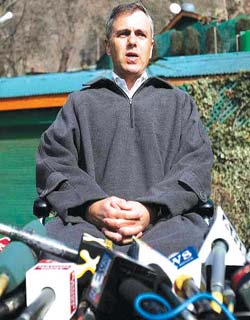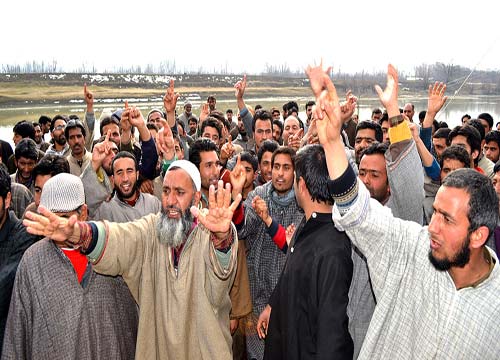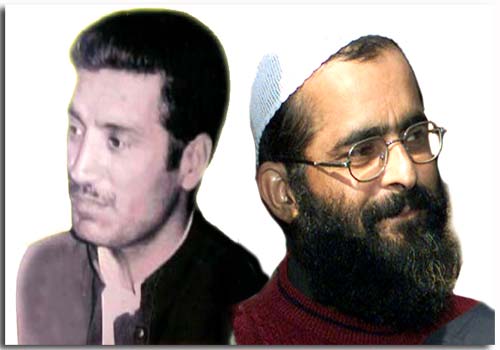As unionists and pro-freedom leaders have come together to echo fears of political radicalisation among the youth, there is little doubt that the decision to execute Afzal Guru in Tihar jail will remain a volatile issue in Kashmir for many decades to come, Shah Abbas reports.
To ‘tackle’ the situation in Kashmir post hanging of Afzal Guru, additional forces were flown in. Curfew was clamped down. Media was ‘gagged’. Kashmiris lacked access to news channels on cable and internet service was downed. Syed Ali Geelani and Mirwaiz Umar Farooq were house arrested out of their homes. Almost all the prominent pro-freedom leaders and activists were detained and chief minister had to call his full team of cabinet from Jammu to camp in Kashmir. Even a lawmaker was forced to be in a police station for a week’s time.
The hanging of Afzal might have ‘satisfied the collective conscience of India’ and the situation of Kashmir might return to normal in days to come, but the secretly performed act will definitely have its long term impacts and consequences in Kashmir, on the natives and in the whole region.
Kashmiris have already started identifying themselves with Afzal. Scores of social netowrking site Facebook users have replaced their profile pictures with the photographs of Afzal, the second Kashmiri hanged in Tihar Jail.
“How to describe Kashmiri youth’s reaction to Afzal Guru’s execution at Tihar jail in Delhi – anger, frustration, alienation and abandoned?,” said a political science student at University of Kashmir.
“Everyone is talking about Maqbool Bhat’s execution in 1984, which became a rallying point for armed insurgency in 1989. Who knows what Guru’s hanging will bring? One thing is sure – Guru’s hanging is a bad omen for those Indians, Kashmiris and Pakistanis who have been advocating peaceful solution of Kashmir conflict,” the student added.
Hurriyet Conference (M) chairman, Mirwaiz Umar Farooq feels that New Delhi is at war with people of Jammu and Kashmir. He said that Afzal Guru’s hanging has damaged the prospects of any dialogue with India.
“The APHC had been advocating for dialogue for over a decade but New Delhi is at war with the people of Kashmir. By hanging Afzal Guru, New Delhi has damaged any prospects of future dialogue process,” Mirwaiz said. He added that Afzal’s hanging will trigger widespread hatred against India among Kashmiri youth as it did after hanging of Maqbool Bhat in 1984. “It might trigger another armed struggle,” he warned.
“New forces may crop up and they will not listen to us. We too would be rendered irrelevant because the new forces would speak in a different language. Once you push people to the wall, they have no other way but to respond with equal aggression,” he said.
Not only is the pro-freedom camp apprehensive about the implications of a political decision (the hanging of Afzal) made by the Congress core committee as a desperate attempt to counter the Modi march to Delhi but the unionist politicians are voicing similar views.
An angry Omar Abdullah slammed the execution of Afzal Guru and said this would reinforce a sense of alienation and injustice among generation of youth in the valley. “Please understand that there is more than one generation of Kashmiris that has come to see themselves as victims, that has come to see themselves as a category of people who will not receive justice,” Omar Abdullah told a TV channel.
“Whether you like it or not, the execution of Afzal Guru has reinforced the point that there is no justice for them, and that, to my mind, is far more disturbing and worrying than the short-term implications for the security front,” he added.
Opposition PDP patron Mufti Mohammad Saeed is of the opinion that if there ever was an overwhelming reason to use the provision of commutation provided by our constitution, both for legal and political reasons, it was this. Referring to the peace process, Mufti said the latest events have unfortunately created a sense of defeat among the people who have been bruised by six and a half decades of uncertainty and bloody history. “I wish it doesn’t consume another generation of Kashmiri youth but one cannot wish away the apprehension” Mufti said.
He said that it was no good to regret the inability of the government to deny Afzal’s family a last mandatory meeting with him or deny his body to the family. “This reduces Mahatama Gandhi’s country, the world’s largest democracy and a genuine candidate for super power status, to a ‘banana republic’.”
For Mehbooba Mufti, the execution of Afzal and the manner of dealing with the fallout in Kashmir has resulted in reinforcement of the sense of denial of justice among the people. She said there was a long standing grouse among the people in the state that they have been treated differently and unjustly at collective and individual levels when it came to application of law and constitution. “Unfortunately this view has only been vindicated by the way and the myopic handling of Guru’s case and its impact on Kashmir,” Mehbooba said.
“While the long term repercussions of Afzal hanging would have to be observed carefully, it is time that government of India revisited the entire approach to J&K and the problems faced by it,” she added.
Afzal Guru was hanged two days before Kashmir was to observe a strike to remember Mohammad Maqbool Bhat, the first Kashmiri hanged in Tihar Jail 29 years back. Afzal was laid to rest beside the grave of Bhat in the jail premises. Guru was hanged at 8am in the presence of 8 people in Tihar Jail and he was reportedly dead after 8 minutes of hanging.

Probably sensing the situation brewing in Kashmir, Prime Minister, Dr Manmohan Singh reportedly expressed displeasure over the ‘circumventing of basic human parameters’ otherwise envisaged in the routine hanging procedures in the execution of Afzal Guru. India is seriously thinking to ‘please’ Kashmiris by some ‘concessions’ usually known as CBM’s. It has been already reported that the GOI is considering some ‘political announcement’ to help Kashmir return normal. Indications to this effect were clear in a PMO meeting on February 11, that Manmohan presided.
Bhat was hanged on February 11, 1984 and Guru on February 9, 2013. In between the two dates, the political discourse in Kashmir changed so swiftly with immense human costs that it lacks precedence in the valley’s nearly 500 years history after it was annexed by Mughal India.
“We finally have got our own 9/11,” Altaf Ahmad changed his Facebook status, minutes after the deployments were made in Srinagar and elsewhere in the valley.
When Bhat was hanged, nobody heeded desperate appeals of Abdul Gani Lone and Aazam Inquilabi for a protest. The news passed with a brief stone pelting incident. Many years later, the situation took such a drastic turn that yearly strike on February 11 needs no education. Kashmir has a peculiar role reversal post such deaths. In execution, Bhat was born a hero. An empty grave for Bhat lies in Srinagar’s sprawling Shaheed Mazaar at Eidgah with an epitaph that the “remains are lying with India”. The cemetery got a second hollow grave just two days after Afzal was hanged. A marble sheet erected on it reads the same line “remains are lying with India”.
“Kashmiri youth knew Maqbool through books. Now they gave Afzal Guru to the new generation, a new martyr in blood and flesh. And this generation was born and brought up under the shadow of gun,” said a political commentator.
“In 1984 Kashmir was less mobilized but this time Kashmir has been mobilized for more than 20 years and it has in fact witnessed three mass mobilizations in 2008, 2009 and 2010. There is a lot of information in public domain and even commoners are capable of accessing and processing it, which makes it a different story,” explains Dr Sheikh Showkat, who teaches Law at University of Kashmir.
“It is not only gun versus the state,” says a former police officer who was actively engaged in managing the unrest in 2008 and 2010. “Everybody knows that he (Guru) was treated unfairly in investigations and the trail. The execution was apparently aimed at wreck any effort in future to get to the roots of the conspiracy that ended up in Operation Parakaram. Nobody made an effort to get into the roots of the crisis to know who were the forces behind the conspiracy,” the official who wished to remain anonymous said.
Guru, a medical college drop-out, became a militant and swiftly surrendered. He set up a business and managed his survival. He got married in 1998 and fathered a boy. But this “spent force” is sometimes “coaxed” and put to use. Guru was assigned something by somebody in the counter-insurgency grid. Soon he landed in police custody.
Cutting across party lines, both the ruling NC and the opposition PDP, the real crisis is that the hanging has blunted, for the time being, the chances of any reconciliation between Kashmir and Delhi. “It has bruised the collective conscience of Kashmir because he neither got a fair trail nor his family was intimated in time,” says Ghulam Nabi Rattanpuri, NC member parliament. “And another related incident that added to this hurt psyche is when a group of Kashmiri boys and girls was jointly attacked by Bajrang Dal and Delhi police at Jantar Mantar.”
But a very few foresee a reaction that might trigger a second phase of militancy. “It is ruled out in the given situation. The only impact is the Himalayan addition to the historic gulf that existed between Delhi and Srinagar,” says political scientist Gull Wani. “It will impede the process of re-engaging youth.”

The other aspect of the crisis impacts the future of the mainstreamers like NC and PDP. Both the parties are trying to extricate themselves from the incident. For the last few days, Omar Abdullah is desperately trying to convey that he had no role in the hanging. He said he was informed for law and order reasons at 8 pm on February 8, a bit earlier before Tihar officials visited Guru in his cell to break the news. Omar said he did not require putting his signatures on the death warrant because the case belonged to a different state. “But the fact remains that it is a legal and technical way that every chief minister has to give his consent if a citizen of his state is to be executed,” said a lawyer in the Kashmir Bar Association.
The desperation is rooted in Bhat’s execution in 1984 whose black warrants were signed by Dr Farooq Abdullah, Omar’s father. But reports emanating from Delhi suggest that Omar was kept in the loop. PDP is out to insist that Omar can’t escape the blame. “NC and Congress are allies at the centre and in the state,” says Naeem Akhter, PDP spokesman. “If he says Guru hanging did no good to Kashmir, he has share part of the blame.” Political observers see the fortunes of NC, because it is in power, tumbling in future because of the hanging.
Temporary implications have brough a few days of curfew and the killing of three youth. Kashmir will bounce back to normalcy soon. It would neither impact the tourism nor any investment. “But the anger that Guru’s execution generated will exhibit over some other incident,” says a former police man.
Between Afzal Guru’s hanging at Tihar and the executions of Satwant Singh and Kehar Singh at the same jail lies a gap of 24 years. During this time, India has risen tremendously in economic and strategic terms but the decline in the collective morality is evident in the indecorous secrecy which prevailed over the latest execution.
When Indira Gandhi’s assassins were hanged on January 6, 1989, the government of Rajiv Gandhi did not hide the President’s rejection of the mercy petitions of Satwant and Kehar. Both were allowed an eleventh hour opportunity to contest that rejection in the Supreme Court. When the court dismissed their petitions, the date of their execution was made public. Their families were allowed inside the jail for a final goodbye. As many as 20 members of Kehar Singh’s family and 13 of Satwant Singh’s family, including his father, were given permission to meet the condemned men.

But in Guru’s case, the government went against not just all democratic norms but fundamental human decency. It has also insulted the country’s judicial system. “The Conscience of the Nation, which broadcasts live from TV studios these days, unleashed its collective intellect on us — the usual cocktail of papal passion and a delicate grip on facts. Even though the man was dead and gone, like cowards that hunt in packs, they seemed to need each other to keep their courage up. Perhaps because deep inside themselves they know that they all colluded to do something terribly wrong,” author and activist Arundhati Roy wrote about Afzal’s hanging.
The Indian political fraternity and intelligentsia not only welcomed, but some even applauded the hanging of Guru. They saw it as a culmination of the legal process, the law of the land taking its due course. But India didn’t treat Afzal Guru’s execution with the same sense of jubilation with which it greeted Ajmal Kasab‘s death. Not just in Kashmir, protest marches and demonstrations broke out all over India. A number of activists are accusing the UPA of being high handed and the Supreme Court of being a party to a case of botched justice.
“A constitutional republic that is insecure about letting a man in chains say his final goodbyes is something that we all need to worry about. Is a state that resorts to secret executions out of fear of demonstrations and protests capable of dealing with the many serious challenges that face this republic?” Nitya Ramakrishnan, a senior lawyer, who defended Shawkat Guru and Afshan Guru in the Parliament attack case from the trial court up to the Supreme Court wrote.
The answer to this question is not very hard to find!

















Plz see it